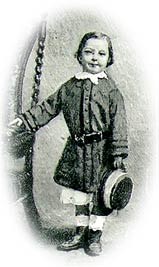






| Arthur Conan Doyle | ||||
Arthur Conan Doyle's humble beginnings did not predict his future success. Born on May 22, 1859, to a middle-class, Catholic family, he grew up on Edinburgh's rough-and-tumble streets, far from his successful grandfather and uncles, who hobnobbed with London's intellectual elite. His celebrated grandfather, John Doyle, had reinvented the art of political caricature. John Doyle's eldest son, also named John, became a well-known caricaturist himself, and the second son, Richard, began his career as a successful cartoonist for Punch (an early magazine devoted to political satire) and ended it as a famous book illustrator. Two other sons were also successful in different fields. Arthur's parents, Mary Foley Doyle and Charles Altamont Doyle, had moved to Scotland from London, hoping that Charles could advance his career in architecture. Having inherited some measure of his family's artistic talent, Charles began with every hope of success, but never realized his dreams. Plagued by depression and alcoholism, Charles was a distant father and husband, becoming so detached from reality that he ended life in an asylum. With considerable charity, his son Arthur later said of him, "My father's life was full of the tragedy of unfulfilled powers and of underdeveloped gifts." As the only active parent, Mary
Doyle had a strong influence on Arthur, the eldest surviving son
of seven children, instilling in him a love of chivalric romances
and a firm belief in the English code of honor. She made the boy
memorize and recite his family's genealogy, ancestor by ancestor.
When left to himself, Arthur loved to read American "wild west"
adventure stories, especially those of Bret Harte and Thomas Mayne
Reid, an Irish immigrant to the U.S. who wrote The Scalp Hunters
(1851), young Arthur's favorite book. As an adult, Conan Doyle felt
that the highest vocation he could pursue as a writer was to create
well-researched historical romances idealizing British history.
|
||||
